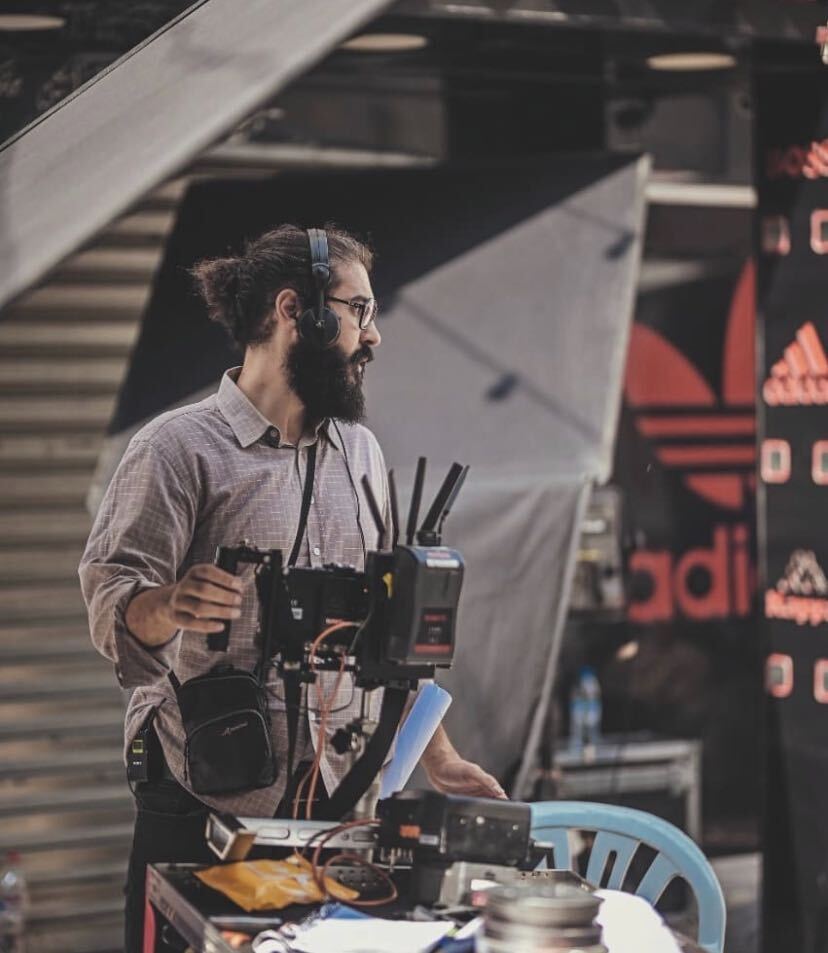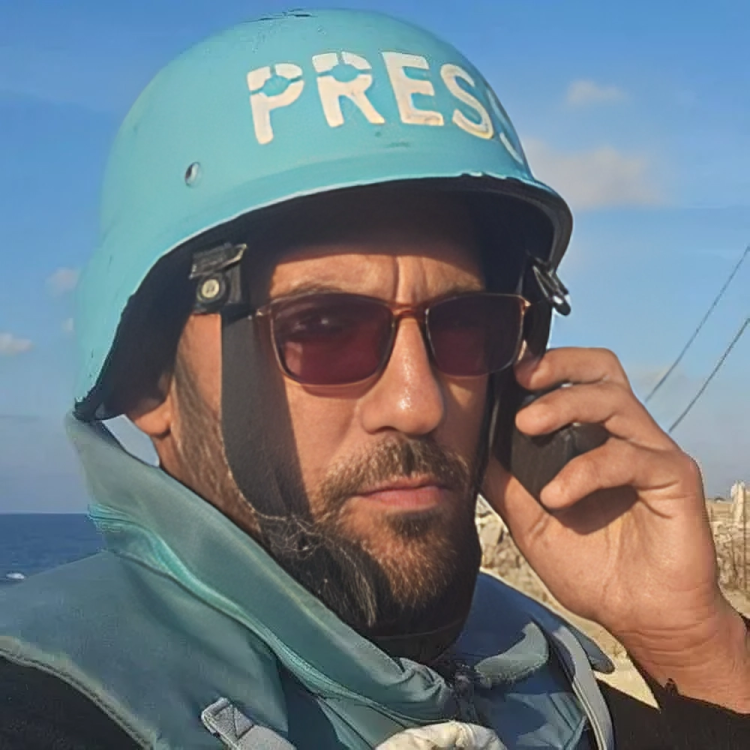Doha News sat down with the director of the award winning film ‘200 Meters’, a Doha Film Institute [DFI] funded movie screened at last year’s Ajyal Film Festival.
In the past two weeks, Palestinians, mainly in the the besieged Gaza Strip, faced one of the deadliest Israeli aggression and violence that killed 248 people, including 66 children.
But even prior to the brutal flare-up, Palestinians had grown further isolated from the rest of the world and even their own land thanks to life under an Israeli apartheid state.
This was the case for 33-year-old Palestinian filmmaker Ameen Nayfeh, who was no stranger to the illegal practices of Israel’s vast and decades-long human rights violations.
Born in an Israeli hospital, Nayfeh’s mother is from the 1948 area and his father is from the West Bank. When his family went to Jordan, he was unable to go back to Palestine until 1999, just over one year before the second intifada [uprising] erupted.
Speaking to Doha News from the West Bank, Nayfeh summed up his life experience in four terms: the intifada, the separation wall, apartheid and civil wars – all of which have inspired him to amplify Palestinians voices that continue to be silenced by Israel, going beyond the borders and the wall.
“We grew up watching the news and I’ve been hearing the term ‘soft power’ since as young as I can remember. Media and art are a soft power that we should have learned by now, after 70 years, to use it for our cause, to tell our stories. This is why I studied filmmaking,” said Nayfeh.
https://twitter.com/dohanews/status/1331250787931082760
Nayfeh directed the award winning film ‘200 Meters’ which told the story of life behind the West Bank separation wall and the realities of daily life under occupation.
The film focuses on the 200 metre separation wall and Nayfeh’s personal experience in Palestine, where he was once refused entry at an Israeli checkpoint to attend the burial of his grandfather. Similarly, he could not see his dying grandmother without obtaining the eight-hour Israeli permit.
“I made 200 Meters because I’ve been deprived of my family – and this is only my story. Imagine the story of a diaspora deprived of even visiting Palestine, to their fathers’ land,” he told Doha News.
His film was screened at various film festivals around the world, from Egypt, to Qatar to as far as Venice. However, the filmmaker was shocked to learn just how ignorant people were to the plight of Palestinians, even among an Arab audience.
“People in Egypt came up to me after the screening of my film and told me that it was their first time understanding what it means to have a separation wall in your daily life. Imagine, people in an Arab country do not understand the extent to which a separation wall can affect our daily lives,” he said, recounting the time his film was screened at the annual El Gouna Film Festival.
The making of the film itself struggled due to permit restrictions imposed by the occupation. In total, it took the team a total of seven years to complete ‘200 Meters’.
In light of the latest escalations in Palestine, Nayfeh was shocked to find silence among some members of the arts industry, prompting him to call them out on their nonchalance to Israeli violence on social media.
“The anger came from speaking to a few friends and asking them to speak about Palestine and their response was cold, saying that posting will not change anything,” said Nayfeh.
“For example on Facebook, you’d see people change their profile pictures every month in solidarity with a different cause, but did not see the same support for Palestine. I don’t know why, but I think there’s the fear of being labelled as an anti-semite.”
In one such incident Nayfeh saw a German director writing what he described as a “neutral post” that mentioned the 1948 Nakba [mass expulsion of Palestinians] as well as the recent flare-up in violence. While he did hold Israel mainly accountable, the director pointed the blame at “both sides”.
“The apartheid and human rights violations will continue. Checkpoints are still here, the Israeli army is still in the West Bank, there’s right wing Israeli mobs and nothing is changing”
“Israelis obviously started to comment on his post and I responded by telling him about my experience being born in Palestine in an occupied area with memories that were only attached to the occupation,” he said.
The Western director later took down the post and re-posted it days later due to what Nayfeh saw as pressure from social media users online.
“Israelis interfere in everything and never give anyone the space to express their solidarity with Palestinians.”
Nayfeh also expressed his disappointment in filmmakers who he previously interacted with over the love of his film yet maintained silence on Israeli human rights violations committed against Palestinians.
“Then they come and tell me ‘we were touched by your film’ and thank me for sharing my story. I do not want you to be touched by my film, do not thank me, I want you to do something [about the situation in Palestine].”
The Palestinian filmmaker also delved into privilege by Western filmmakers who are able to easily enter Palestine while he, as a native to the land, struggles to obtain a permit to freely shoot his film.
“For example the beach is only 15km away from me, which means I’d be able to get on a bicycle and go to it in about 20 minutes. But I can’t. I’m not allowed to go to the beach. Meanwhile Western filmmakers can easily access the beaches of Tel Aviv and Yaffa.”
Read also: ‘Cinema is a Palestinian’s only weapon’: A review of Ajyal’s Audience Award winner, ‘200 Meters’
His drive to create stems from the ignorance he said he witnessed among filmmakers who visited Palestine without trying to look into the daily injustices the indigenous people.
“They speak of enjoying their time in Palestine, but when you ask them about visiting Jerusalem, Bethlehem and seeing the separation wall, they say they didn’t have the time to do so.”
For a long time, Nayfeh believed global solidarity with Palestinians was an unlikely feat due to Israel’s strategic move to isolate them from the rest of the world, more recently by censoring Palestine-related content.
“Meanwhile in Notre Dam, everyone rushed to stand in solidarity with the church and felt more sympathetic towards a heritage site, but not for Palestinian children and those being shelled by the American-funded Israeli violence. Somehow, the latter is not of importance.”
Despite apologies issued by social media companies, activists and journalists still believe there’s a disparity with respect to their content.
“If you’re saying that social media doesn’t make a difference, it does. Why do you think Israel specifically targeted the building housing Al Jazeera and the Associated Press? Why do Instagram and Facebook violate freedom of expression when it comes to Palestinian content?”
‘Keep talking’
Nayfeh believes that artists should take initiative to raise Palestinian voices as it is a humanitarian issue that will continue to go on as long as Israel moves with impunity.
“I think every single artist and human being with conscience and humanity should be speaking today about Palestine. Even if there’s a ceasefire, we should not stop speaking about Palestine until there is justice,” he said.
“Remember, we are talking about the most basic human rights. They do not exist in Palestine and the world is somehow okay with it.”
Read also: 6 Palestinian films you need to watch
When asked about the cruciality of amplifying Palestinian voices now in comparison to the past, Nayfeh said that Israel is now losing what he described as a “media war”.
“A sudden wave of voices advocating for Palestinians took the world by storm. Just look at the protests that have happened and are happening around the world. Even in the US you have people in Congress calling for a halting of arms sales to Israel. There’s more pressure now,” he said.
The filmmaker described artists as soldiers in the media war, reiterating the importance of utilising the industry’s tools in order to fight the battle.
“Artists are now fighting the media war. Cinema is one of the few weapons that we can fight our colonisers…I think everyone now should be making films, everyone in the arts industry, from music to the cinema world.”
‘Overdone’ Palestinian films
For directors keen on working on Palestine, a common obstacle to the the pitching process for festivals and production agencies is the term “overdone”, he said, standing up from his chair and walking to the back of his room.
“See these?” Nayfeh asked, pointing to a handful of lanyards he held in his hand.
“There’s at least 30 of them and up to 80% of them were from festivals that I attended seeking funding and producers. The majority of them told me that my story has been done before and how I’m making another film about the occupation,” he added.
Eager to spend time with their uncle, the interview was interrupted when Nayfeh’s young nieces walked in, climbing up on his shoulders and embracing him.
“We watch the news all the time, so our nieces ask lots of questions. Imagine, they once asked if they’d die if Israel fires a rocket at us,” he said.
“We try to isolate them from the topic because it is still too early for them to understand the scope of the Palestinian case, but they know the basic information about the occupation as they live in it and see the separation wall in front of them.”
Read also: ‘The Return’: the story of Qatar’s first ever car garage
Nayfeh recounted a time in which he had to sneak the young girls into a beach through a hole in the separation wall just to give them a glimpse of it.
“They snuck their way into their own beach, like thieves,” he mocked.
When advocating for human rights, the burden to inform the public is often placed on the people affected by oppression, which also appeared to be the case with the latest escalations in Palestine.
“The biggest burden is on us [Palestinians] we should be the leading force, because if we do not take action, no one will.
“We shouldn’t wait for anyone to amplify our voices, we can do it on our own. Yes the burden is on our shoulders, but also it is on the shoulders of every human being with a grain of conscience.”
Ever since the Egypt and Qatar-brokered ceasefire was announced, global calls for justice in Palestine have also appeared to tone down despite the ongoing presence of occupation forces.
“This cause is still alive. Nothing changed. If the ceasefire happens, the apartheid and human rights violations will continue. Checkpoints are still here, the Israeli army is still in the West Bank, there’s right wing Israeli mobs and nothing is changing.”
“The question I’d raise to anyone who happens to hear my voice is what is more valuable than human life?”
Follow Doha News on Twitter, Instagram, Facebook and Youtube







